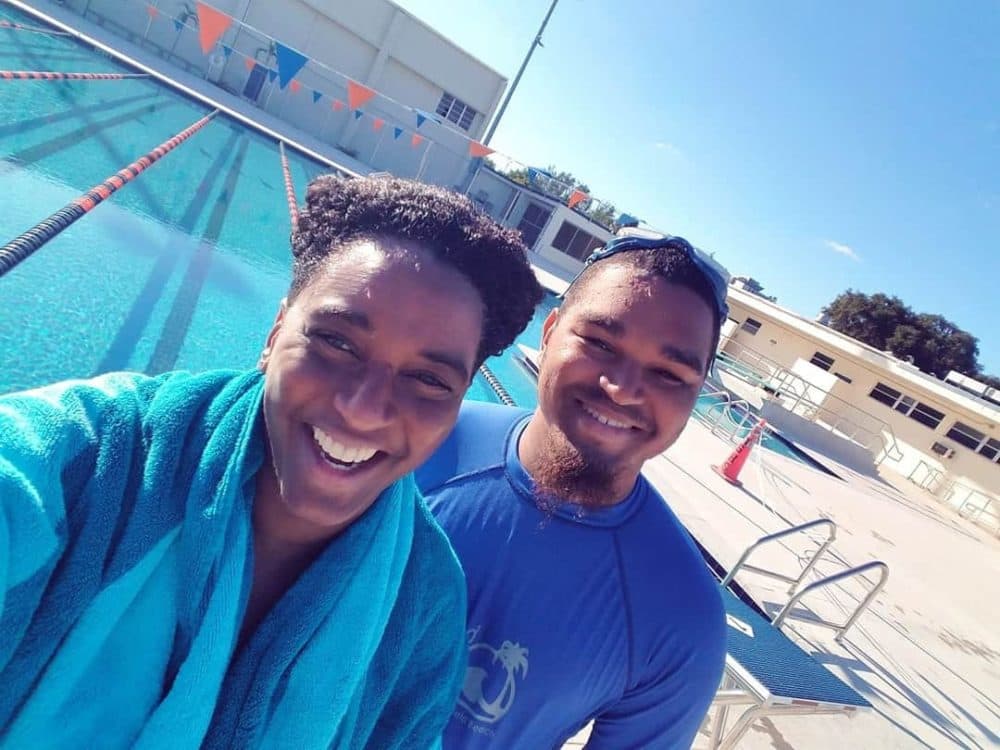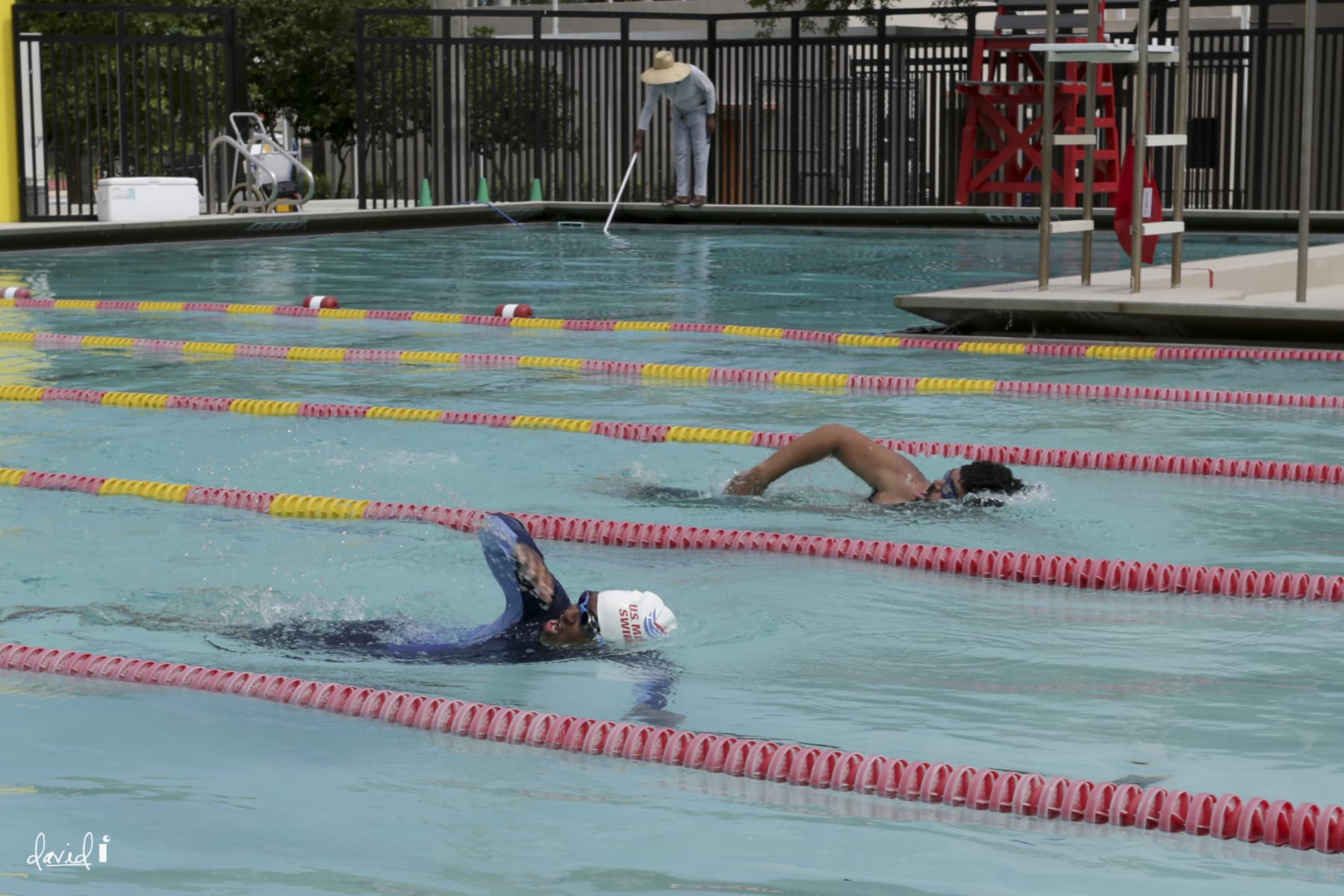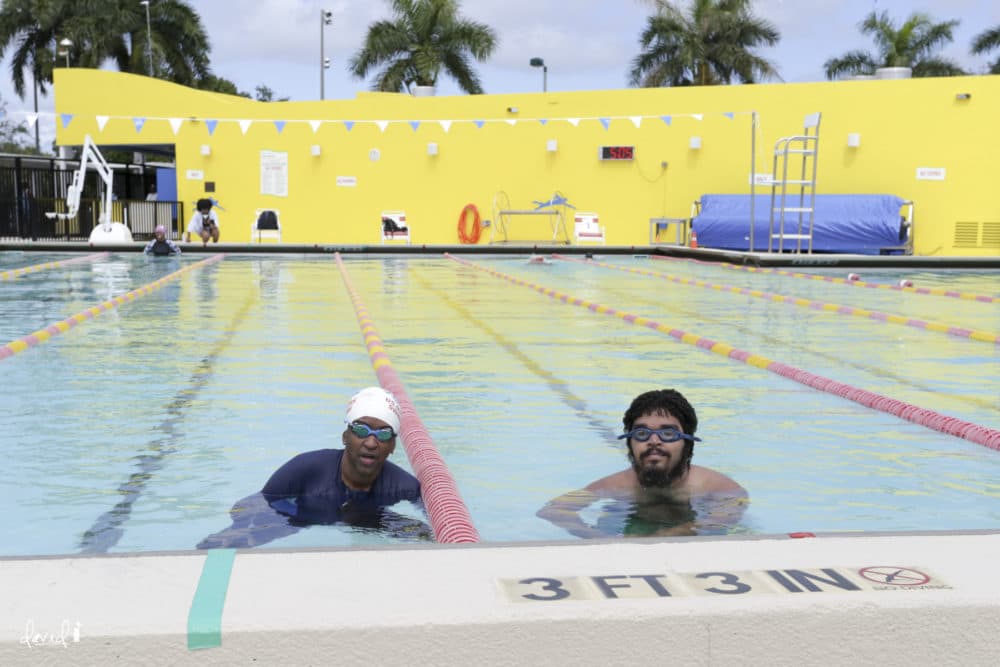Advertisement
'Are We Going To Become Hashtags?' Racism At A Florida Pool
Resume
G is a former competitive swimmer.
"My full, proper name is Ghenete Wright Muir. And I go by 'G.' "
Under normal circumstances, G and her 23-year-old son swim with a group called Diversity in Aquatics. It’s an organization dedicated to making sure that everyone has the opportunity to learn to swim. But it’s also a masters swim club, where swimmers like G get together in Fort Lauderdale for organized workouts.
But G and her son hadn’t swam with their club in a while.
GWM: We hadn’t swam together since March because of the pandemic. So, going to the pool that day, we were really excited. My son, he hadn't exercised throughout the pandemic, really. So he did the research to figure out, are there any pools in Fort Lauderdale that allow for lap swimming? He found two pools within 10 minutes of us. We were not familiar with either one. And we picked that pool, the Carter Park Pool, because of the schedule. We were going to swim on the Sunday.
"When you call the police on Black people, because of the history of Black people and the police, it's ... potentially deadly."
G Wright Muir
As we entered the pool, the person at the entrance, a young white man, said, "Hey, this is for lap swimming." We're like, "Yeah." But I understood he meant as opposed to recreational swim. But, for me, that's already, like, a microaggression and an implicit bias that I feel he has. Seeing two Black people, he's feeling, "Hey, you might be in the wrong place. This is for people who can actually swim laps."
So, you know, this was a moment. I kept walking, but I noticed it, you know?
KG: I'm going to stop you for just a second, because there's something about this pool that has come up. And it sounds like you didn't know this about the pool. But the pool was built during segregation, specifically as a place for Black families to swim. Was that in your knowledge base at all at the time?
GWM: So what I knew was that I knew I was going into a Black neighborhood. But I didn't know that that pool was built during segregation. I learned it later on that day, when people were shocked and everything.
KG: OK. So you get to the pool ...
GWM: So, because we know it's in a Black neighborhood, I'm also expecting Black people. But, as I walked in, my eyes scanned, and I saw every single person was white. So that struck me as well.
So we asked if we could swim in the same lane. The young man at the entrance said, "Yes." When we went towards the pool, the lifeguard said, "No." And we're like, "That's fine." And then she put us close to each other. But there's a woman between us. Fine.
My son went straight into the pool. It's icy cold. He went in and started swimming. I'm kind of taking my time. I'm sitting on the ledge. I have my legs in. He does maybe three or four, maybe four or five, six laps. He does several enough laps. And I say to him something like, I honestly don't remember, but it's something like, "What stroke are you doing next?" Something just simple like that. One quick sentence. He replied very quickly. And then the woman pretty much says, in a very harsh tone — she didn't greet us — she said, "You can't talk over my lane." And I just felt suddenly, like, barked at. It was just really brash. And then she kept swimming.

So I just asked the lifeguard if that was a rule. Because with Covid, you don't know. I just want to know if that's a rule. And the lifeguard said, "That's not a rule." I swim a little bit. And, when I encounter the woman again, I say, "Hey, you know, it's not a rule. If you'd like to, you could switch lanes." Me and my son will be side-by-side, because we're not going to talk, like, have a conversation. But there's going to be — we're going to say things. I'm going to ask him, 'How many laps?' He's better at keeping track of what we're doing. And we were going to swim a mile, which is several, several laps in a 25 meter pool.
KG: That's a long ways.
GWM: That's a long way.
KG: And I want to say, like, from doing a lot of lap swimming myself, switching lanes is something people do all the time. It's really easy.
GWM: Thank you. Yes, exactly.
So she said in the same brash tone, "I'm not moving." It was just so odd for me, because the way she's speaking with us is so harsh, you know? And I just felt — this felt so unreasonable. So I said to her something like, "Hey, well, you know, me and my son are going to speak."
Soon after that she's complaining: the lifeguard needs to "do something about us. Do something about us." She's not just telling her to do something about us. She's also threatening her job — like, she knows her boss and supervisor. And I'm so disappointed, you know? And I felt it for my son. Like, he would look up puzzled, like, "What's happening?" Like, there's still something happening, you know? So, at some point, she says to the lifeguard, "You need to call the police. Call the police."
I'm distraught now because, you know, with the history of Black people and the police and the current climate ... and I actually say to them, I'm saying, "Why are you calling the police?" I actually said, "Do you watch the news? Have you read any articles recently? I'm here with my son. And my son is a young Black man. He's in his young 20s. And we're instantly vulnerable."
"If we [had stayed] in the pool, the story would be, 'Mother And Son Shot Up In A Pool.' "
G Wright Muir
The young man at the entrance rushes up to say, "Close the pool, everybody out." The swimmer in the water, the woman who harassed us, she says she's not coming out. And my son says, "Neither am I." And I'm actually proud of him. You know, my son is, people who know him are like, "Wow." Because he's an introverted young man. Then we heard the police were coming. And I said, "Masai," I told my son, "You have to come out."
And it was hard for me, because I knew she could stay in the pool. And I knew he could not. And that was very hard for me.
KG: So ... wow. So as you're waiting for the police to arrive, what's your emotion like at that moment?
GWM: I'm distraught. By that point I am distraught. I am. My girlfriend was planning to join us. So I called her and said, "Don't come. Don't come to the pool." She said, "I'm pretty much here." So she comes. When she heard the police were coming, she asked, "Should we leave?" You know, instead of the police encounter. So my mind is like, "Should I leave? I'm here with my son. We're Black people. Is something going to happen? Are we going to become hashtags?" This is just, like, seconds. And then I felt like, "Why should I have to, like, scurry away?" So I said, "No."
So when the police walked onto the deck, it was a surreal feeling. You're standing in a swimsuit. You know, my son is in his trunks. It's very vulnerable, you know? And that lady's in the pool. She didn't have to get out. And then the police commanded her out. And she said, "No."
So, when they asked us to leave the deck, my son once again was like, "We need to see her out of this pool." We know she's the one who's antagonizing us, and she gets to stay. You know, we're going back and forth. But, while you're arguing with people who have guns on their hips, you're thinking, "This is certainly not worth our safety at this point." So I said, "We have to leave."
We have to walk by her standing in the pool. For my son to see that, it was really hard for me. Because I feel like everything that we've done with raising our kids in America, we have taught them that being Black is not going to give you a disadvantage. You should not be feeling that you're inferior.
So we go into the parking lot, and my son says, "Let's wait here. Let's make sure she does get out." And then the officers, at least two, if not all three, come out to the parking lot. And they said we have to leave the whole parking lot. And my son says, "I need to see her leave." That's really just to know he's being treated equally, you know, like he's not being discriminated against. And the officer says you got to leave the entire compound, the entire park, and you can't return for 24 hours.
Meanwhile, that lady’s in the pool. So that was really — I mean, we left there. I mean, I was sickened. And, for my son, I mean, we got home, and he said, "You know, Mommy, I was trying to protect you." And I was — I just broke down, because I was like, "I was trying to protect you."
And none of us had the power. None of us had power.
KG: Well, the Fort Lauderdale police told Newsweek that everybody was treated the same. But bodycam footage shows the woman told the officers that she was, "in a state of undress." And she refused to get out of the water until you and your son had left. What do you make of the fact that she was allowed to make that demand?
GWM: Well, to me, it's racist. They treated us equally, in terms of demanding the same thing — demanded us all out of the pool. We are not equal in that they didn't require her to get out of the pool. We're all in a state of undress. So she was not dressed any differently than any of us. So we're all in the same boat and should have been treated that way.
KG: You know, we talk about privilege, but it's privilege to be able to say "No" to the police.
GWM: Yeah, no, that's a privilege that we don't have. If we're in the pool, the story would be, "Mother And Son Shot Up In A Pool." And then some people would be extremely upset that we're shot up. And some people would say, "Well, they were ordered. They refused. What could they do?"
She did not even get shouted at. In 2020. It might as well have been 1960.
KG: How has this continued to affect you and your son?
GWM: You know, it's been a lot. It's been really — it's been traumatic. It has been helpful that we've had an amazing — we've had overwhelming support from the community. So that's very validating for us, but especially my son. This is the community saying to him, "You are correct. You were right. You were being treated differently." So that's really helpful to be validated.
I don't know if you're aware that there was a swim-in on Sunday?
KG: I am, I was about to ask you about that. So you are part of this group called Diversity in Aquatics. And one of the things that they're really focused on is addressing the barriers that have historically excluded Black people from pools and learning how to swim. And so tell me, what actually happens at a swim-in? Do you actually swim?
GWM: We actually did swim. So what we had was — we had speakers. I spoke. It was really hard. My voice cracked the entire time. But it was really — it was restorative for us to get back in the water a week later. I mean, my stomach was in a knot just approaching that property. I had never been there before. My own experience was a nightmare. So to go back was challenging. But to go back in, you know, being embraced by the community. Some people said, "Hey, what happened to you happened to us. We all felt it." When they heard the story, they're like, "This is not just you. This is an assault on all of us."

I think one of the good things from this is that we're learning more about that this is not just an isolated incident. This is part of a history of Black people feeling unwelcome around the water. And that's why this organization is so helpful.
KG: Absolutely. So I have not mentioned until now that you are a lawyer. And the reason I haven't brought that up is that there are some people who are making the very good point that a person shouldn't have to be a highly educated professional to be believed and listened to in this kind of situation. What do you make of the attention your experience has gotten?
GWM: Well, it's interesting. Because there's no doubt that, because I'm engaged in my community, it did get more attention.
When I lived in New York City, I was about 19 years old. And I lived in a Jewish neighborhood that was an affluent neighborhood. And, one night, I was coming from work. I worked at Madison Square Garden. An unmarked police car — people came out and they jumped me. They asked me what I was doing in the neighborhood. I said, "My mom, she owns an apartment in this neighborhood." I was devastated. I just broke down crying. And I was 19, 20 years old. And, the next morning, I went to the police station and complained. And nothing. Nothing.
Now, several years later, you know, I was able to speak to the mayor the next morning. And someone higher up in the police department called me.
But it shouldn't matter.
KG: What has it been like for you to have to tell this story over and over again? Because I imagine that there's a part of you that just wants to move on.
GWM: Yes. It's a traumatic experience for me. I experienced it with my son, my first child. You know, we didn't need the police here. We didn't need three men with guns on the pool deck. Like, this could have been resolved. When you call the police on Black people, because of the history of Black people and the police, it's deadly. Potentially deadly.
I mean, I'm so grateful, of course, me and my son were not physically harmed. But we could have been.
G Wright Muir is a lawyer and LGBTQ advocate. Follow this link to learn more about Diversity in Aquatics.
This segment aired on August 1, 2020.
